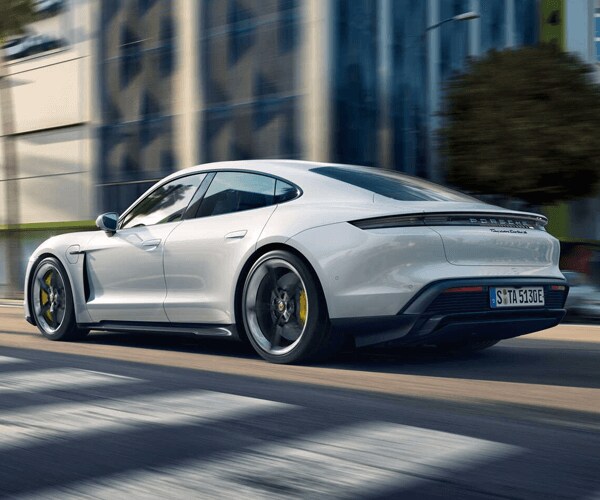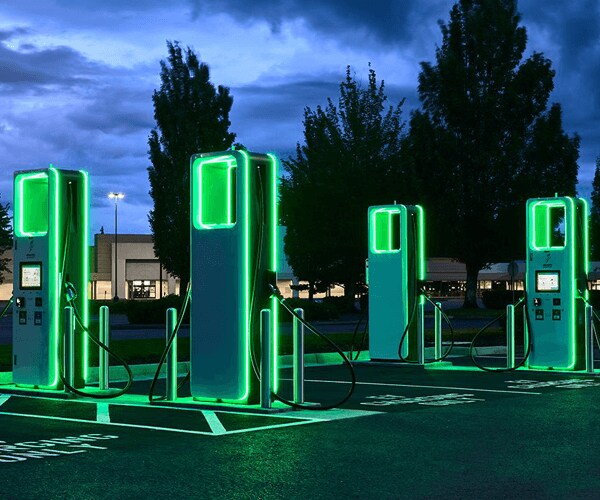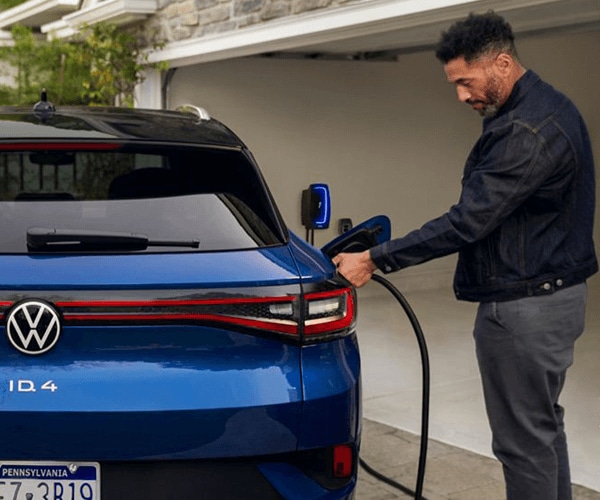
Shopping for any vehicle can be challenging, but for first-time electric car buyers, it can be a whole new world. To help make the experience easier, we've compiled some information together about electric vehicles just for you.
Electric Vehicles (BEVs)
Battery electric vehicles (BEVs) run only on electricity from batteries charged by plugging into an outlet or charging station. BEVs have no gasoline engine and don't produce tailpipe emissions.


Electric-only motor
No emissions
Does NOT require gasoline
Requires plug-in charging
Some electric vehicle models are:
Nissan ARIYA
BMW i4
Volkswagen ID.4
Plug-in Hybrids (PHEVs)
Plug-in hybrid electric vehicles (PHEVs) are similar to conventional hybrids, except PHEV batteries can be charged by plugging into an outlet, and PHEVs can substitute plug-in electricity for gasoline.


Gasoline engine and electric motor
Some emissions
Requires gasoline and
plug-in charging
Some plug-in hybrid models are:
Jeep Wrangler 4xe
Kia Niro Plug-in Hybrid
Alfa Romeo Tonale
Conventional Hybrids
Hybrids combine a gasoline engine with an electric motor, but they can't plug-in because their batteries are charged from capturing braking energy that converts kinetic energy into electricity.


Gasoline engine and electric motor
Some emissions
Requires gasoline
Does NOT plug in
Some conventional hybrid models are:
Toyota Highlander
Honda Accord
Toyota Prius

State-of-the-art Technology
Electric vehicles often come with tons of exciting features.
Pedestrian Detection
Adaptive Cruise Control w/Stop and Go
In-Car WiFi
Remote Engine Start
Forward Collision Warning
Front and Rear Parking Sensors
Lane Keep Assist
Power Trunk/Liftgate
4 yr / 50K mi Basic Warranty
8 yr / 100K mi Hybrid/EV Warranty
Android Auto and Apple CarPlay

Spacious, Quiet, Smooth, Green
Electric vehicles have more space available due to having fewer components than traditional vehicles.
Electric vehicles have quieter engines since there are less mechanical parts moving.
Phone calls, conversations with passengers, music and podcasts are all much more enjoyable.
Fully electric vehicles don't have any tailpipe emissions, however, plug-in hybrids and conventional hybrids do - although it is much less than the emissions of a traditional vehicle.

The Safest Option
Electric vehicles are often at the top of their class in terms of crash and safety ratings.
Electric vehicles have fewer components than traditional vehicles so there's less opportunity for anything to break or go wrong.
Battery packs lower the center of gravity and offer additional rigidity to the frame.
Electric vehicles are federally mandated to carry separate warranties for their battery packs (8 years or 100,
Fully electric vehicles don't have any tailpipe emissions, however, plug-in hybrids and conventional hybrids do - although it is much less than the emissions of a traditional vehicle.

Torque & Acceleration
Even lower-cost electric vehicles are fun to drive due to the instant torque and handling of electric engineering. In fully electric vehicles, all of the torque is readily available at 0 RPM.
The Wrangler 4xe has an impressive 470 pound-feet of instant torque for heart-pounding performance off-road and on-road.
Porsche Taycan Turbo S accelerates 0 to 60 mph in just 2.6 seconds. And this can be repeatedly reproduced: consecutive acceleration is possible, up to a top track speed of 161 mph.
Kia EV6
Tour the all-electric 2023 Kia EV6, inside and out. Let Lora and Johnny give you the inside scoop on this sleek, sexy new EV.
BMW i4
Join Amber and Jonathan on a tour of the 2022 all-electric BMW i4. Just because it's electric doesn't mean it's not everything you expect from BMW. Smooth, quiet ride with the engine performance you want. Sleek styling, self-parking, head-up display and a self-healing grill.
Volkswagen ID.4
Jonathan and Allie take you on a tour of the all-new Volkswagen ID.4 EV SUV. The all-new Volkswagen ID.4 SUV is truly something to behold. On the outside, clean aerodynamic lines make for a striking presence on the road. On the inside, plenty of room makes for a spacious, comfortable cabin-it will transform how you think about electric cars.
Mercedes-Benz EQS
On our 50th episode of #ZeroTo60TV, we're taking you on a personalized tour of the first in a line of extraordinary electric luxury vehicles from Mercedes-Benz. From the full-width hyper screen infotainment center to its 350-mile electric range, the all-new 2022 #Mercedes-Benz #EQS580 sedan demonstrates the evolution of luxury...electrified.
Porsche Taycan
Join Amber and David for a test drive of Porsche's brand-new, electric powerhouse, the 2020 Porsche Taycan. Incredible speed, sleek design and agility to spare. The Taycan is a true force.
Jaguar I-PACE
First review of the all-new 2019 Jaguar I-PACE EV400. This is the first all-electric car from Jaguar and it's a knock-out. Zero to 60 mph in 4.5 seconds and on-demand torque will push you back in your seat as this new cat leaps to life.
Audi e-tron
Our review of the new 2019 Audi e-tron. Amber and David show us the amazing new features in this beautiful, premium, electric SUV.
Jeep Wrangler 4xe
In part one of our two-part series on two of Jeep's hottest new Wranglers, Zero To 60 host, Mark Arsen speaks with Frank Malfara at Leith Chrysler Jeep about the powerful and efficient hybrid Jeep, the 2021 Wrangler 4xe.

Further than ever
There are lots of mix-ups about electric vehicles, but the main one is the fear that you can't drive very far, known as range anxiety. In fact, many electric vehicles can go over 200 or 300 miles on a single charge, and the ongoing build-out of the national EV-charging network should help reduce any fears of running out of charge.

Easily find charging
There are 21,000+ public charging stations with 65,000+ individual charging outlets in the United States, as of late July 2019. But EV and plug-in hybrid owners don't need charging stations the same way traditional vehicles need gas stations, because most of the time they're charging at their own garage or workplace.

Charge from home
EV and plug-in hybrid owners can charge at home by plugging in the charging cord that comes with the vehicle to any standard three-prong outlet. It takes a while, but you can charge anytime in the convenience of your own home. Alternatively, owners can install a wall charger for a much quicker charge.
Less Maintenance Means Lower Costs
Fully electric vehicles don't have a traditional combustion engine. As a result, 24+ mechanical components that would ordinarily require routine service are no longer a problem because EVs don't have them. Choosing EV means bypassing oil changes, cooling system flushes, transmission servicing, and air filter, spark plug, and drive belt changes.
Lithium Ion Battery Warranty
Whereas the standard warranty coverage for a traditional vehicle is 3 years or 36,000 miles with 5 years or 60,000 miles for the powertrain, electric vehicle's lithium ion batteries are under warranty for at least 8 years or 100,000 miles, whichever comes first
